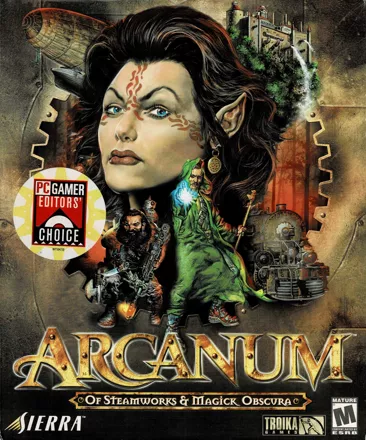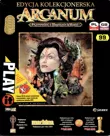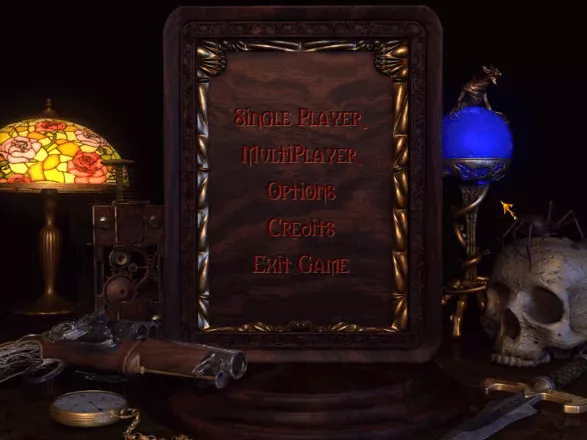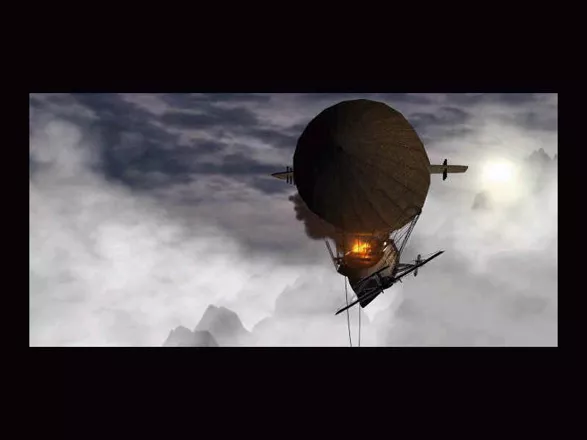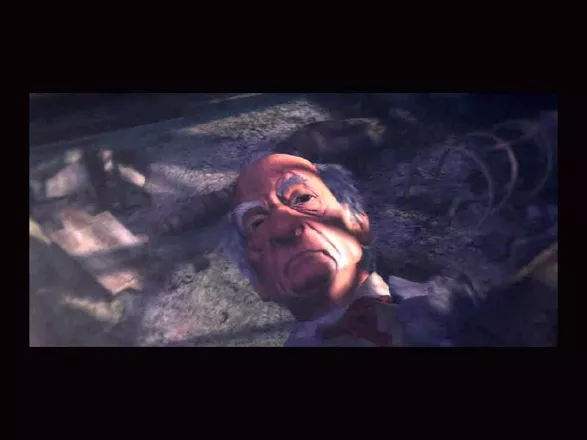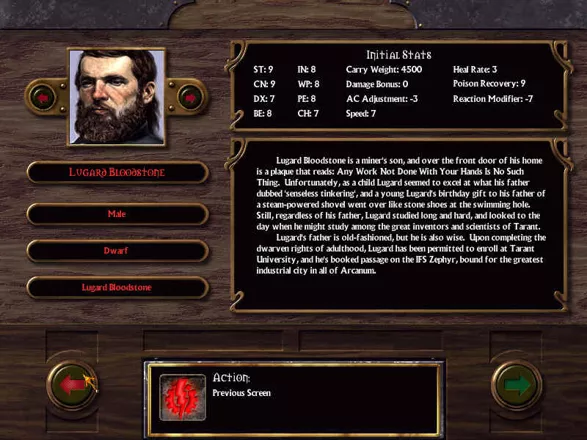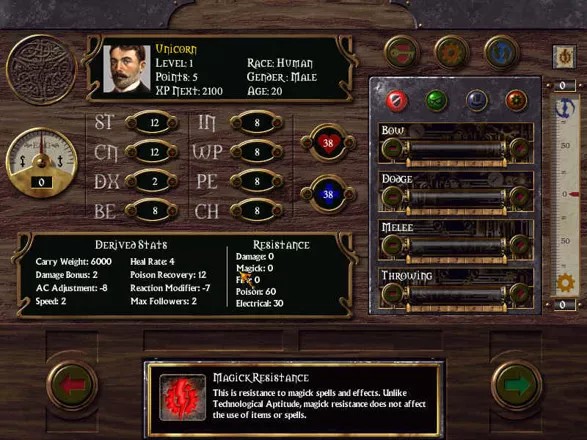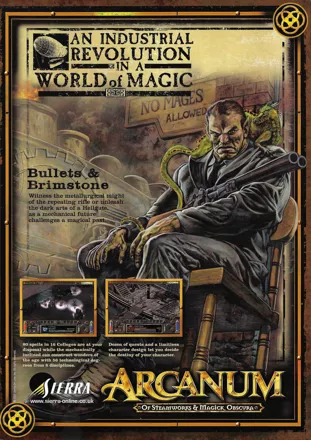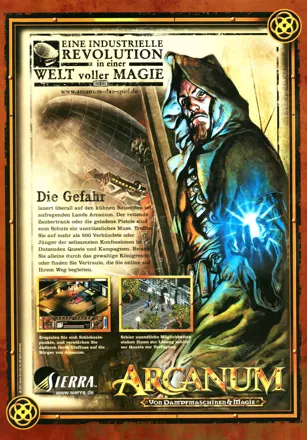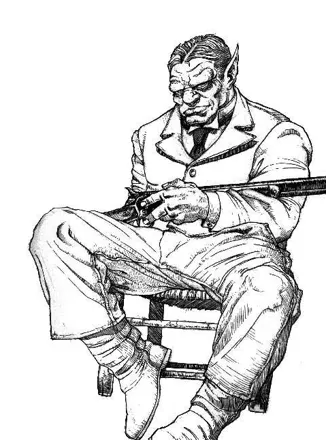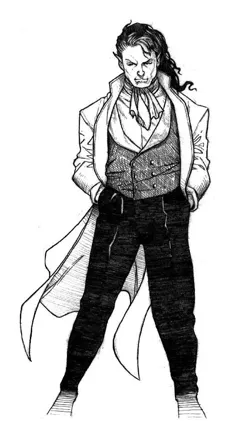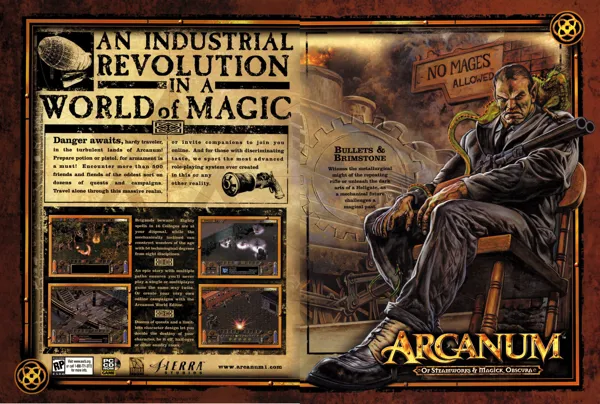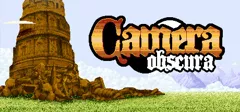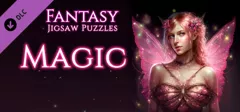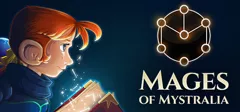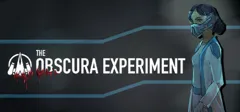Arcanum: Of Steamworks & Magick Obscura
Description official descriptions
The luxury zeppelin IFS Zephyr begins her maiden voyage from Caladon in the Kingdom of Arland to Tarant, one of the largest cities in the technologically advanced Unified Kingdom. Suddenly, while the zeppelin is cruising over mountains, two monoplanes attack it and eventually shoot it down. The two half-ogre attackers die in flames along with all their victims except two who miraculously survived. However, one of them, an old gnome, is mortally wounded. Just before he dies, he gives a silver ring to the other survivor and tells him to "find the boy". The witness of the crash, a man named Virgil, declares that the now only survivor is "The Living One", a reincarnation of a deity, and offers to follow him wherever he goes. The hero begins a long and perilous search for the mysterious boy, the origins of the silver ring, and the unknown enemy who was behind the attack on the zeppelin.
Arcanum is a role-playing game similar in concept and many gameplay principles to Fallout. It is set in a unique world, which can be described as mixture between Tolkienesque fantasy, steampunk technology and elements of British and North American culture of the 19th century: dwarves may carry molotov cocktails, and a half-orc protagonist can travel by train between Victorian-like cities. Magic and technology are opposed to each other; most humans and dwarves embrace technology, while some elf clans stick to the old ways and consider scientific progress evil.
In the beginning of the game the player creates the main character, choosing from a variety of races, attributes, magical or technological disciplines, social skills, backgrounds, etc. When the character levels up, the player can increase his main parameters as well as any available skills. Like in Fallout games, the player directly controls only one character; however, companions who join the party may be given orders, and their inventory can be managed by the player.
The game is open-ended: the player is free to explore the vast world from the onset, undertaking a large amount of side quests or following the main story. Social interaction plays a significant role: depending on the player character's charisma and intelligence attributes, as well as persuasion skill, many problems can be solved in a non-violent way. The amount of companions willing to follow the protagonist also depends on the latter's charisma rating; companions may also leave the party if they disagree with the hero's behavior.
The player can select one of the three combat modes for the game: real-time, turn-based, and fast-paced turn-based. Turn-based mode is similar to the combat in Fallout games: characters require action points to move, attack, or cast spells.
The game includes an editor called WorldEdit, which allows players to create their own maps, campaigns, and non-playable characters. Objects from the base game can be carried across to the player-created scenario. The scenery editor allows players to create their own objects. It is also possible to set and change game variables, i.e. the amount of skill points required to perform a specific task.
Spellings
- 奥秘:技术与魔法 - Chinese spelling (simplified)
Groups +
- BestSeller Series (Cendant / Havas / Vivendi Universal) releases
- Fantasy creatures: Dwarves
- Fantasy creatures: Elves
- Fantasy creatures: Gnomes
- Fantasy creatures: Halflings / Hobbits
- Fantasy creatures: Orcs
- Gameplay feature: Alchemy
- Gameplay feature: Brothels
- Gameplay feature: Character development - Skill distribution
- Gameplay feature: Gambling
- Gameplay feature: Karma meter
- Gameplay feature: Multiple endings
- Middleware: Bink Video
- Physical Bonus Content: World Map
- Protagonist: Female (option)
- Sound engine: AIL/Miles Sound System
Screenshots
Promos
Videos
Add Trailer or Gameplay Video +1 point
See any errors or missing info for this game?
You can submit a correction, contribute trivia, add to a game group, add a related site or alternate title.
Credits (Windows version)
157 People (118 developers, 39 thanks) · View all
| Project Leader | |
| Lead Programming | |
| Programming | |
| Design | |
| Animation | |
| [ full credits ] | |
Reviews
Critics
Average score: 79% (based on 61 ratings)
Players
Average score: 4.0 out of 5 (based on 168 ratings with 13 reviews)
That's the way to show those bast... uhh... I mean... good hit sir!
The Good
Arcanum directly continues the role-playing tradition of Fallout games, creating a similar RPG experience in its own original world.
Just like Fallout, Arcanum is a highly flexible, open-ended game, a whole world with vast possibilities and nearly unlimited freedom to role-play. In this game, you are what you want to be. Feel like talking your way out of any situation, charm people and have a huge party? Increase charisma, beauty, and intelligence, but be prepared for some tough combat. Want to talk like an idiot, but be a walking tank? Create a character with 3 points of intelligence and with maximum strength and constitution, and he'll talk grammatically incorrect English, but will beat the crap out of everybody who dares to stand on his way. You can be a good person, perform only good deeds, save families, towns, and kingdoms, or you can be a bad guy, shooting innocents on the streets and making deals with criminals and maniacs obsessed by world domination. You can be a powerful magic user, wielding ancient swords and defending yourself with an enchanted buckler, or you can be a skilled mechanic, make guns and rifles, and drift along with the new epoch of technology. In short, this is a game where you can do what your want, but you also have to deal with the consequences of your behavior.
But with all this freedom, Arcanum doesn't lose the track of its story, which is excellent, especially if we realize this is not a Japanese RPG that is all story and no role-playing, but a game that strives primarily to offer the player the ultimate experience of customizing, exploring, and experimenting. With all its heavy role-playing and its open-ended nature, Arcanum has an interesting, suspenseful story full of surprising twists and philosophical speculations.
The role-playing system in Arcanum corrects many things that were a bit underdeveloped in Fallout. You can raise your main stats, which is good. No more running around with measly 5 intelligence and eating drugs as the only mean to raise it somehow. Fight, perform quests, level up, and watch how you turn into a super-powered muscle mountain, or a respectable sage. Of course, there are also plenty of skills to develop in Arcanum. Whoever says most of the skills aren't necessary, like for example the gambling, probably preferred killing the ultra-tough undead pirate Pete with his skeletons, or performing his three tedious quests, instead of simply winning the ship you need, which you can do only if you are a master gambler. This is the beauty of this game: there are so many unique ways to shape your hero that you are likely to lose yourself entirely in all this experimenting. And think of its replay value!..
In an interesting twist, Arcanum offers three types of combat engines the player can select right from the beginning: real-time, semi-turn-based, and turn-based. Personally, I prefer the turn based combat, which I didn't find slow at all. It was more or less the same style as in Fallout clever, intelligent kind of combat, based mainly on strategy. You have action points which determine the amount of actions you can perform per turn. You also have practically no control over your party members. Of course, they would do stupid things sometimes, but I found the ones in Fallout much more stupid - they couldn't use almost any good weapons, didn't wear good equipment, and were sometimes shooting me instead of the enemies. Having Virgil in your party makes the combat much more comfortable, because his healing skill is extremely powerful, and he does use it when I need help. In general I found the battles in Arcanum to be on the easy side, but that only added to the immense amount of fun I was already having with this game.
Your party members in Arcanum are perhaps not as memorable as in Planescape: Torment, but to call them packhorses is an insult. Of course, just as in Fallout, they really make great packhorses, but have you ever seen a packhorse who falls in love with you? Or a packhorse who believes you are the incarnation of an ancient elven hero? Or a packhorse who will tell you how cruel you are if you kill an innocent person, threatening to leave your party for good if you do this again? Or a packhorse that was once the mighty ruler of dwarves, with a tragic, philosophical story behind? No, they are not packhorses, but great companions on your quest, and there a lot of them, too.
The interesting setting of Arcanum makes the already masterfully crafted game even more appealing. It is a unique mixture of technology and magic, but not in the sense of "science fiction magic", like in some Japanese RPGs, but a kind of an alternate Earth: "steampunk" era, similar to the end of the 19th century in England or North America. The game captures the atmosphere of the time, the clothes, the speech, the social structure, and paying attention to the smallest details - interior design of rooms, the growing power of technology, the general rise of activity among people, the desire to conquer and discover more, old-fashioned planes and trains, names of streets, the fight between the old and the new, etc.
Yet this realistic epoch is mixed with a world that strongly reminds of Tolkien's Middle Earth, populated by elves, dwarves, and orcs. All those creatures have now to deal with the development of technology by the humans, and to solve the problem in their own ways. Arcanum manages to seamlessly merge those two completely different worlds.
Just to illustrate how much detail was put into the game: try reading all those books scattered around the world of Arcanum. One of the books is called "The Orc Question", and the author discusses in a typical haughty manner of an English Victorian gentleman what to do with the orcs, how to deal with them, and whether they are really such villains as most people say they are. This book is interesting not only due to obvious parallels to our own reality, but also because the unique style of the 19th century European essays has been carefully preserved here.
Lastly, the music of Arcanum is outstanding, and deserves to be released on a special CD. The whole soundtrack is performed by string instruments. Without too many effects, limited by its intimate instrumentation, this music is both tender and deep, threatening and meditative, emotional and calm, and has a flavor of deep melancholy. The high-quality music of Arcanum can nearly be compared to pieces by Shostakovitch or Bartok.
The Bad
The graphics are functional, but that's all they are. Of course, RPGs are seldom distinguished by their graphics, but it's a real pity that outdated visuals attracted negative attention to the game. Such is the world we live in: games are often judged by their "clothes".
I couldn't get into the real-time combat. I found it way too fast and confusing. The game was clearly developed with the turn-based combat in mind; looks like the real-time one was added as an afterthought.
The game opens with a beautiful CG movie; there are a few others in it, but too few for my tastes. A game with a narrative of this quality could have been more cinematic, pay more attention to dramatic depiction of events.
Oh, and I almost forgot: the level cap! I rarely reach those when I play RPGs; but when I played Arcanum, I hit it at some point before venturing into the final location. Luckily, there is a "level cap remover" floating on the net somewhere; be sure to apply it!..
The Bottom Line
Arcanum is the spiritual heir to Fallout games. Like its famed predecessors, it is a remarkably open-ended game with meticulous customization and nearly unlimited possibilities to role-play. Set in a highly original "Tolkien steampunk" world and offering an interesting, well-written story, Arcanum is a true delight for the RPG gourmet.
Windows · by Unicorn Lynx (181775) · 2010
Troika is dead, Long Live Troika
The Good
As was with Fallout 1+2, the gameplay was, by and by, the main attraction of this game. The options for character development are massive; they put the majority of other games on the market to shame. The character creation is simple (and full of easy ways to waste your points if you haven't played the game before, or haven't consulted a guide), but as the game progresses, the player is given a massive range of options for character development. One of the nicer points about this game is that it is impossible to even come close to mastering more then a handful of the wide range of skills and abilities, it makes replays of the game a completely different experience.
Also worth noting is the great Steampunk setting, that is integral to the story, and also allows for a huge range of environments and characters for the player to explore and interact with. The background graphics add to the atmosphere; your characters explore everything from a industrial revolutionized town, to ancient elven cities in trees.
The story in this game is also well done, but often is ignored for long stretches of time in lieu of exploration and sidequests.
The Bad
The character graphics were abysmal for their time; the animation was jerky, the detail was low, and, in addition to that, the style was weak and generic feeling.
The battle system is good, but flawed. It is very close to Fallout's system, just not as well planned out and executed. There is also a "real-time" setting that is worthless except for the easy battles, as it moves far far faster then the player is able to command his character.
Also, even with it's final patch, the game still has terrible crashes and will occasionally eat a save game.
The Bottom Line
A brilliant RPG that needed just a little bit more polish to have achieved true classic status.
Windows · by aiolos (4) · 2006
Seems to be mything something.
The Good
The gimmick behind Arcanum is that it’s a fantasy role-playing game with technological elements. Thus, a steam-driven train might take you past the burial grounds of a dragon, halfling thieves might shoot at you, or you could fight a mechanized spider in a dungeon illuminated by electric lights. This does not mean that magick and technology work in concert however. One of the many storylines in this game deals with the struggle between magick and technology. This plays out in several ways regarding character development and means that as you progress towards either technology or magick, your ability to use the oppositional skills wanes. And it draws interesting parallels to the often antagonistic struggle between science and religion in our world.
So the question then, is how well does the gimmick work? Like the Fallout series, Arcanum presents a class-less role-playing system. As your character progresses you may specialize in thief-type skills, magic ones, etc. and through this create your class. Unlike Fallout, as a fantasy game you have your pick of races including human, elf, dwarf, and orc. These races have unique benefits and detriments and some close off gender options- Gnomish women, for example, are never seen. Arcanum does not make use of Fallout’s SPECIAL attribute system, but presents a similar one, which like Fallout, really affects game play. Most RPG’s don’t well integrated attribute systems, but every statistic in Arcanum really affects gameplay. Intelligence determines conversation options, Beauty affects how people react to you and Dexterity determines how fast you move. There are also statistics such as hit points and fatigue which are based on combinations of attributes and the level of your attributes determines how far you can advance in certain skills.
Which brings me to the skill section, which is the most complex system I’ve seen in any RPG. The skill set is broken down into three sets: character skills, magic skills and technological skills. These sets are then broken down into subsets such as combat, specific magic school or specific technological discipline. As you advance in level you apply points to these skills to increase your ability. You can also receive training in the character skills and advance from Apprentice to Expert to Master. Often training is purchased, but Master’s require special quests. Now you can also apply points to your attributes and you only receive one point per level. Therefore, deciding how to spend these precious points becomes strategic.
One final thing regarding the character: alignment. Your character begins the game with a neutral alignment. Depending on your actions (the quests you complete and your interaction with people) your alignment will shift towards good or evil. This is a dynamic system which does away with the complications of the traditional AD&D system and works very well within the game.
Actual game play resembles other RPGs, perhaps too much. You go on many mini-quests while uncovering the larger story. Talk to dozens (hundreds) of people and gain followers. Opinion of the usefulness of the followers seems to be mixed, but I felt like mine were great characters that did far more than carry heavy equipment. I was never able to make use of my dwarven technologist, but I think this was more my fault than his. They have wonderful conversations, fought very well, had interesting reactions between themselves and added to my enjoyment of the game.
There are many areas to explore and several major cities. Talking to the people in the cities results in useful information and interesting quests. During the game I played, I had to solve several murders, track down missing nobles and I found a fun X-Files themed conspiracy regarding half-orcs. There was seldom a time when I did not have at least one quest to work on and I usually had several on the backburner.
Graphically, this game is dated since it does not use 3D graphics, the graphics are good but result in some performance issues. Sound is wonderful. The string score is beautiful, voice work is consistently well above average and ambient noises are realistic and appropriate.
This is a very long game but highly replayable. As a non-thief character, I missed the extensive thieves’ underground, as a melee character I never got far into magic use and technology, and as a good character I didn’t touch on the dark side of Arcanum (however I did perform some evil acts for the greater good and some of my good acts resulted in bad outcomes). Finally, like the Fallout Series, at the end of the game, you get to see how your adventures affected the places you went traveled to.
The Bad
While the story in Arcanum was very good, it is unclear for most of the game. I think I prefer games where you know what points is from the get-go. Several major themes seem to disappear near the end of the game including the one with hero/villain technologist Gilbert Bates (Bill Gates?). Although, this could just be how I played the game. I also wished for more of the steam-punk, Victorian fantasy setting that the box seemed to advertise. While there was a mix of magick and technology in the game, most of the Arcanum world is entrenched in a pseudo-Tolkien setting. Pratchett’s Discworld books present a similar idea more convincingly.
The attribute/skill section I described above is very complex and since the game has a level cap it pays to plan ahead. I was very unhappy with the level cap because I wanted to do more with my character and if you can’t advance in level any more- why go on quests? I found myself very apathetic towards the end of the game, tired of the subquests and solely interested in the end of the game.
Of course one of the reasons for the level cap is the extremely poor balancing in the game. I was simply too powerful too soon. I was also very wealthy, so money oriented quests didn’t matter and I had all the items I wanted. While the ability to increase your attributes was fun, I was able to become almost superhuman. I think they needed to reconsider this element in favor of the traditional RPG feeling that attributes are carved in stone and only acts of God can change them.
While I mentioned some interesting quests, too many of them involved searching dungeons for a person/item. With all the dungeon crawling combat, you level up way too quickly. In short, elements of this game suffered from the Monty Haul syndrome discussed in AD&D books. RPGs have to be about more than who has the more points/gold, etc. By the time I got to the final battle, it was a joke. I was successful in a few minutes and never felt in any danger. The story and framework of Arcanum deserve more than a Cheaterz Diablo-type romp.
Finally, I mentioned that graphics were outdated. On my new system, I experienced several lock-ups because the game wasn’t making use of my 3D card. Characters weren’t particularly well animated, combat animations were minimalist, and the dungeons were visually unimpressive. There were some excellent rendered scenes, but they occur late in the game.
The Bottom Line
I played this voraciously and still don't know how I feel about this game. I definitely want to replay this game as a completely different type of character. As it stands now, I'd describe it as a failed masterpiece.
Windows · by Terrence Bosky (5397) · 2003
Discussion
| Subject | By | Date |
|---|---|---|
| [false alarm] glitch: no speech? | Rola (8483) | Oct 20, 2018 |
Trivia
Graveyards
A hidden graveyard, containing tombstones of Arcanum's most diehard fans, can be found at the location W: 1060 S : 809 on the world map. Another graveyard has lots of humorous epitaphs written on the graves. However, many of them are taken directly from Baldur's Gate.
Manual
Following on the tradition started in the Fallout manuals, Arcanum's manual includes an actual cooking recipe. This time it's Grandma Cookhill's Three Bowl Bread.
Mod pack
On 7 January 2002, the development team released a free mod pack, containing six new and exclusive adventures. It can be downloaded here.
Mods
Chris Beddoes has produced a mod for this game that addresses some balance issues, makes it overall a little more challenging, and replaces the entire opening area and quests. This latter is important because the opening area was used in the demo, and many players have just seen it too many times to want to start a new character any more, despite the near-infinite possibilities for character design. It can be found here.
References
- There's a location in the game called the "Isle of Despair" which is a penal colony which holds it's inmates in a remote island behind a magical barrier that makes it impossible to escape. Now, when asking the generic NPCs for its location, they answer:
"You mean the Black Isle? I'm not quite sure..."
Black Isle Studios is the name of Interplay's RPG division, and the former home of Arcanum's development team.
- A portion of the Stillwater giant quest contains a major (and fairly obvious) reference to Monty Python and the Holy Grail, specifically the part where you have to trace the beast to a cave and capture it. In fact, the whole sequence plays just like in the movie, you follow some giant footprints, enter a dark cave filled with bones and dead bodies, and so on.
- There's a Fallout reference in the walled city of Tulla. Apparently one of the students had to venture out in the Wastes to find a Water Gem. He has since returned and the Mages fear how the journey changed him and the influence he might have on other students. Plus, he's wearing mechanized armor.
- There's actually a reference to Bill Gates and Microsoft stealing the ideas for their Windows operating system from Apple's MacOS. One of the most influential and wealthy of people in Tarant is Gilbert Bates (Swap the G and B in Gill Bates and you have Bill Gates) because he brought the power of the steam engine to mankind. Another steam engine developer, called Cedric APPLEby is spiteful of Bates's success and claims that he invented the steam engine first and that Bates had stolen the idea off him.
Server shutdown
The official online servers were shut down on 1 November 2008.
Soundtrack
The soundtrack to Arcanum was composed by Ben Houge for string quartet and was provided in its entirety on Computer Gaming World's May 2001 demo CD.
Both the soundtrack and its sheet music are available as a free download.
Stillwater giant
Despite the result of the associated quest, the Stillwater giant DOES exist. It can be found on a random encounter between Stillwater and the pass to the elven city.
Information also contributed by Rambutaan, Sciere, Terrence Bosky, uclafalcon, Unicorn Lynx, weregamer, Wojit and Zovni
Analytics
Upgrade to MobyPro to view research rankings!
Related Sites +
-
Arcanum Walkthrough by Quandary
by Steve Metzler -
Developer's Site
Troika's Arcanum page -
Hints for Arcanum
Having trouble with Arcanum? These hints are arranged in question and answer form to help you solve it on your own. Includes complete solutions. -
Mike's Arcanum Resources
A really good Arcanum fan site with many things you can't find elsewhere. -
Official Arcanum Website
The Official Sierra: Arcanum Website (English) -
Official website (german)
Official website (german) -
Sierra: Arcanum - Soundtracks
The Arcanum soundtrack is officially available for download here! -
Terra Arcanum
Wonderful fansite with walkthrough and good gameplay hints.
Identifiers +
Contribute
Are you familiar with this game? Help document and preserve this entry in video game history! If your contribution is approved, you will earn points and be credited as a contributor.
Contributors to this Entry
Game added by Unicorn Lynx.
Additional contributors: Zovni, Kaliban, Indra was here, Jeanne, phlux, JRK, tbuteler, jsbrigo, Alaedrain, Patrick Bregger, Plok.
Game added August 25, 2001. Last modified April 5, 2024.
